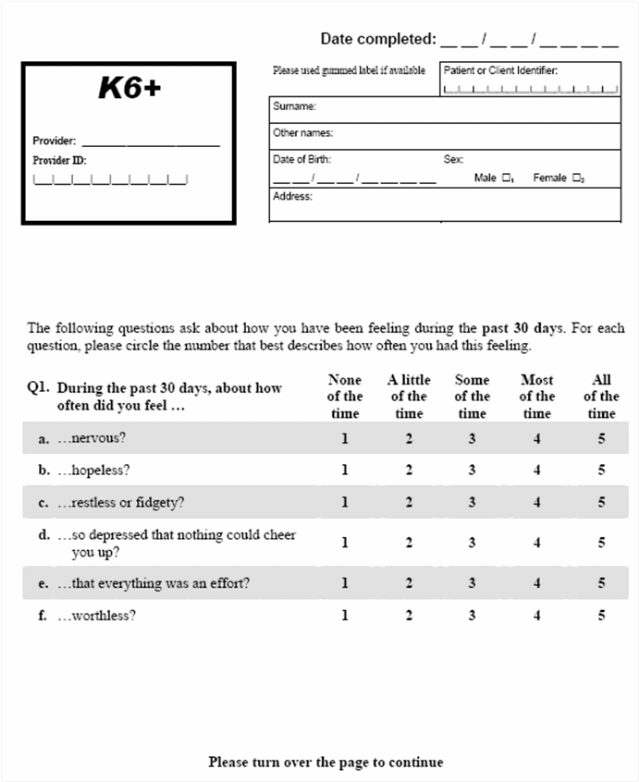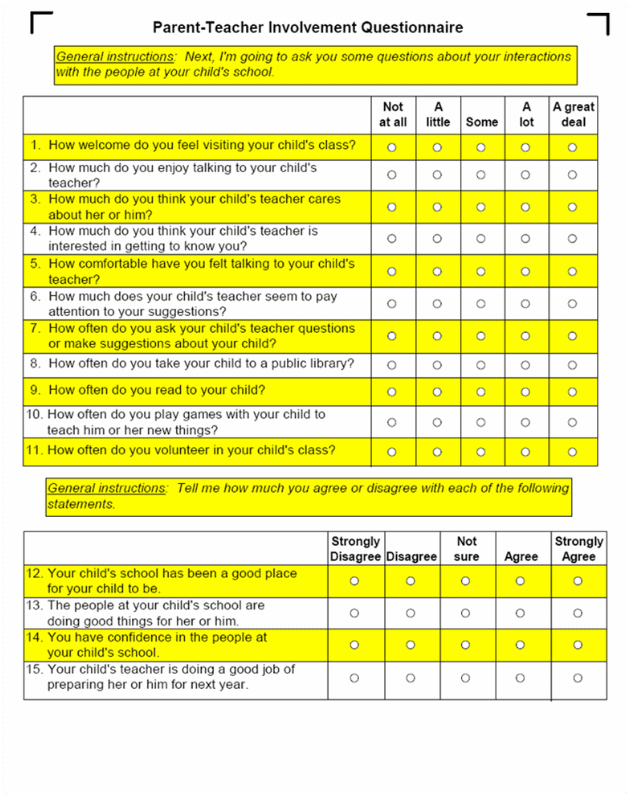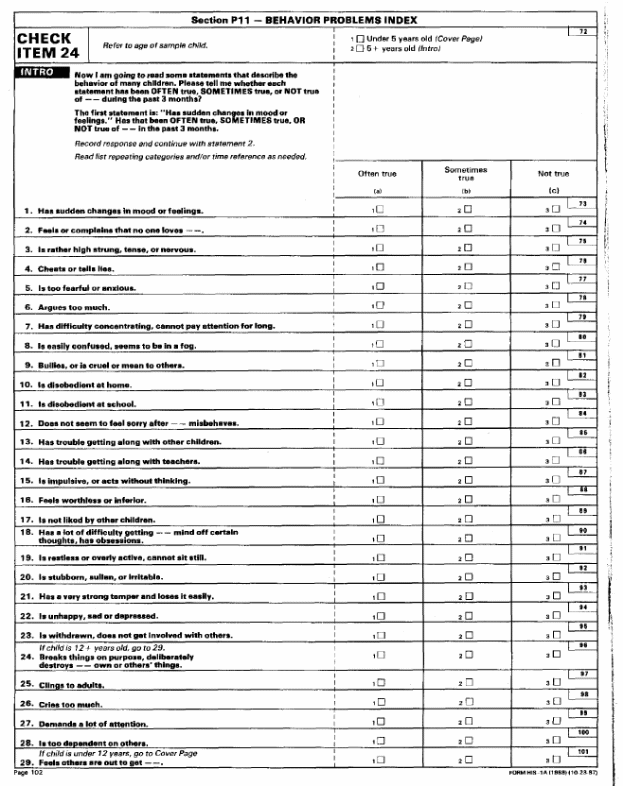HHS/ACF/OPRE Head Start Classroom-based Approaches and Resources for Emotion and Social skill promotion (CARES) project: Impact and Implementation Studies- Baseline Parent Survey
HHS/ACF/OPRE Head Start Classroom-based Approaches and Resources for Emotion and Social skill promotion (CARES) project: Impact and Implementation Studies
OMB CARES 2nd Package_Appendix A.4_Baseline Parent Survey
HHS/ACF/OPRE Head Start Classroom-based Approaches and Resources for Emotion and Social skill promotion (CARES) project: Impact and Implementation Studies- Baseline Parent Survey
OMB: 0970-0364
Appendix A.4: Head Start CARES Baseline Parent Survey
 Updated
December 22, 2008
Updated
December 22, 2008
BASELINE PARENT SURVEY FOR
HEAD START CARES
BASELINE MEASURES
TABLE OF CONTENTS
3 Section A – Demographic Characteristics (from Foundations of Learning & FACES 2006)
Includes items on: age, gender, DOB, race/ethnicity, child care arrangements, adults and other children in household, housing arrangements, marital status, educational attainment, employment information including salary, household income, public support received
14 Section B – K-6 Kessler Psychological Distress Scale
Kessler, Andrews & Colpe (2002)
15 Section C – Parenting Stress Index, Short Form (PSI)
Abidin (1983)
17 Section D – Parent-Teacher Involvement Questionnaire (primary caregiver version)
Bierman, Greenberg & CPPRG (1996)
18 Section E – Emotion-Related Parenting Styles Self-Test
Hakim-Larson, Parker, Lee, Goodwin, & Voelker (2006)
Shortened Dismissing/Disapproving and Emotion-Coaching subscales (5 items each) based on a recent factor analysis by Hakim-Larson.
19 Section F – Financial Resources, Housing and Connection to Social Institutions
From Yoshikawa, from Early Childhood Cohort Study of the Center for Research on Culture, Development, and Education
21 Section G – Behavior Problems Index (BPI)
Zill & Peterson (1986)
23 Section H – Social Skills Rating System (SSRS): Social Skills Scale – Parent-Preschool items
Gresham & Elliot (1990)
Section A – Demographic Characteristics
Parent Survey
(to be completed by Parent or Primary Caregiver of child enrolled in Head Start)
I am going to ask you some questions about yourself, your child (INSERT CHILD’S NAME) who is enrolled in Head Start, and your family. Your answers to my questions will be kept private.
1. What is your relationship to [CHILD]?
BIOLOGICAL MOTHER 1
BIOLOGICAL FATHER. 2
ADOPTIVE MOTHER. 3
ADOPTIVE FATHER. 4
STEPMOTHER. 5
STEPFATHER 6
GRANDMOTHER. 7
GRANDFATHER 8
GREAT GRANDMOTHER 9
GREAT GRANDFATHER 10
SISTER/STEPSISTER 11
BROTHER/STEPBROTHER 12
OTHER RELATIVE OR IN-LAW
(FEMALE) 13
OTHER RELATIVE OR IN-LAW
(MALE) 14
FOSTER PARENT (FEMALE) 15
FOSTER PARENT (MALE). 16
OTHER NON-RELATIVE (FEMALE) 17
OTHER NON-RELATIVE (MALE) 18
PARENT’S PARTNER (FEMALE) 19
PARENT’S PARTNER (MALE) 18
DON’T KNOW d
REFUSED r
2. Are you [CHILD]’s legal guardian?
YES 1
NO 0
DON’T KNOW d
REFUSED r
3. What is your birth date?
|___|___| / |___|___| /|___|___|
DON’T KNOW d
REFUSED r
4. Are you of Spanish, Hispanic, or Latino origin?
YES 1
N O 0 GO
TO 6
O 0 GO
TO 6
DON’T KNOW d
REFUSED r
5. Which one of these best describes you . . .
Mexican, Mexican American,
Chicano, 1
Puerto Rican, 2
Cuban, or 3
another Spanish/Hispanic/Latino
group? 4
DON’T KNOW d
REFUSED r
6. What is your race? You may name more than one if you like.
CODE ALL THAT APPLY
WHITE 1
BLACK, AFRICAN AMERICAN,
OR NEGRO 2
AMERICAN INDIAN OR ALASKA
NATIVE (SPECIFY) 3
ASIAN INDIAN 4
CHINESE 5
FILIPINO 6
JAPANESE 7
KOREAN 8
VIETNAMESE 9
ASIAN (NOT FURTHER SPECIFIED) 10
NATIVE HAWAIIAN 11
GUAMANIAN OR CHAMORRO 12
SAMOAN 13
OTHER PACIFIC ISLANDER
(SPECIFY) 14
ANOTHER RACE (SPECIFY) 15
DON’T KNOW d
REFUSED r
7. In what country were you born?
U SA 1 GO
TO 9
SA 1 GO
TO 9
ANOTHER COUNTRY (SPECIFY) 2
DON’T KNOW d
REFUSED r
8. How many years have you lived in the United States?
|___|___| NUMBER
DON’T KNOW d
REFUSED r
Now let’s talk about [CHILD] enrolled in Head Start.
9. CONFIRM OR ASK: Is [CHILD] a boy or a girl?
GIRL.. 1
BOY 2
DON’T KNOW d
REFUSED r
10. How old is [CHILD]?
___________ YEARS
11. What is [CHILD]’s birth date?
|___|___| / |___|___| /|___|___|
DON’T KNOW d
REFUSED r
12. Is [CHILD] of Spanish, Hispanic, or Latino origin?
YES 1
N O 0 GO
TO 14
O 0 GO
TO 14
DON’T KNOW d
REFUSED r
13. Which one of these best describes [CHILD] . . .
Mexican, Mexican American,
Chicano, 1
Puerto Rican, 2
Cuban, or 3
another Spanish/Hispanic/Latino
group? 4
DON’T KNOW d
REFUSED r
14. What is [CHILD]’s race? You may name more than one if you like.
CODE ALL THAT APPLY
WHITE 1
BLACK, AFRICAN AMERICAN,
OR NEGRO 2
AMERICAN INDIAN OR ALASKA
NATIVE (SPECIFY) 3
ASIAN INDIAN 4
CHINESE 5
FILIPINO 6
JAPANESE 7
KOREAN 8
VIETNAMESE 9
ASIAN (NOT FURTHER SPECIFIED) 10
NATIVE HAWAIIAN 11
GUAMANIAN OR CHAMORRO 12
SAMOAN 13
OTHER PACIFIC ISLANDER
(SPECIFY) 14
ANOTHER RACE (SPECIFY) 15
DON’T KNOW d
REFUSED r
15. In what country was [CHILD] born?
U SA 1 GO
TO 12
SA 1 GO
TO 12
ANOTHER COUNTRY (SPECIFY) 2
DON’T KNOW d
REFUSED r
16. How many years has [CHILD] lived in the United States?
|___|___| NUMBER
DON’T KNOW d
REFUSED r
17. Is Head Start your child’s first formal educational experience?
1 Yes-(skip to #19)
0 No
18. If no, was your child in a center-based or home-based child care arrangement last year. By home-based I mean, any group care with several non-related children in a home that wasn’t your own. Do not include babysitting.
1 My child attended a center-based child care arrangement last year
2 My child attended a home-based child care arrangement last year
3 Neither (SPECIFY:_______________________________________)
19a. How many days each week does [CHILD] go to [PROGRAM NAME]?
|___|___| NUMBER
DON’T KNOW d
REFUSED r
19b. How many hours each week does [CHILD] go to [PROGRAM NAME]?
|___|___| NUMBER
DON’T KNOW d
REFUSED r
20. Does your child spend time in extended day/wraparound/after-school services at their Head Start center?
1 Yes
0 No-(skip to #21)
20a. If yes, how many total hours per week does your child spend in extended day/wraparound/after-school services at their Head Start center?
____________HOURS
21. Does your child spend time in another child care arrangement, other than Head Start & extended day/wraparound/after-school services?
1 Yes
0 No-(skip to #23)
21a. How many days each week does [CHILD] currently spend in another child care arrangement (other than Head Start & extended day/wraparound/after-school services)?
|___|___| NUMBER
DON’T KNOW d
REFUSED r
21b. How many hours each week does your child currently spend in another child care arrangement (other than Head Start & extended day/wraparound/after-school services)?
|___|___| NUMBER
DON’T KNOW d
REFUSED r
22. If using another child care arrangement (besides Head Start & extended day/wraparound at Head Start), what kind of arrangement is your child in for at least 5 hours a week? Choose all that apply. (READ CATEGORIES)
a Your spouse or partner who is not the child’s biological parent
b The child’s grandparent or great grandparent
c The child’s sibling or half-sibling
d Another of your child’s relatives
e A babysitter or non-relative in your child’s home
f A family daycare or other non-relative in another home, where a Head Start or Early Head Start program was not offered
g A preschool, nursery school, or daycare center, where a Head Start or Early Head Start program was not offered
h An extended day program before or after school, lessons, or activities like, boys or girls club, YMCA or YWCA, OR
i Some other kind of arrangement (Specify: ______________________________________)
My next questions are about the people who live in the same household as you and [CHILD].
23. Including yourself, how many adults age 18 and older live in your household?
|___|___| NUMBER
DON’T KNOW d
REFUSED r
24. Please list the relationships of those adults to your child (Start with yourself)
Adult |
Relationship to Your Child |
a. |
Respondent |
b. |
|
c. |
|
d. |
|
e. |
|
f. |
|
g. |
|
25. Including [CHILD], how many children age 17 and younger live in your household?
|___|___| NUMBER
DON’T KNOW d
REFUSED r
26. Please list the relationships, and ages of those children. (Start with child enrolled in Head Start)
-
Child
Relationship to Your Child
Age
a.
Child in Head Start
b.
c.
d.
e.
f.
g.
h.
27. How many years have you lived at your current address? ______ YEARS
28. How many times have you moved in the past year? ______ TIMES IN PAST YEAR (If none, write 0)
29. Which of the following best describes your housing arrangement last month? If you have more than one arrangement, choose the one where you spent the most time last month. Did you: (READ CATEGORIES)
1 own your own home or apartment
2 rent your home or apartment
3 live in emergency or temporary housing (e.g. shelter)
4 live with friends or relatives and pay rent to them
5 live with friends or relatives and not pay rent to them, OR
6 have some other housing arrangement (SPECIFY: ______________________________)
30. Do you live in: (READ CATEGORIES)
1 public housing (housing owned by a federal, state or local government agency)
2 private housing that is subsidized by government aid (e.g. Section 8 or housing vouchers)
3 private housing with no help from the government (e.g. entire rent bill is paid without any public assistance to a landlord, family member, or friend), OR
4 You own your home or apartment
31. Do you own or lease a car?
1 Own
2 Rent/Lease
3 Do not have a car
32. What is the name of your neighborhood public elementary school?
______________________________________________________________________________
0 Don’t know
33. What is your marital status? (READ CATEGORIES AND HAVE THEM CHOOSE ONLY ONE)
1 Single
2 Married
3 Remarried
4 Living with partner (not married)
5 Divorced
6 Separated, OR
7 Widowed
34. What is the highest grade of school that you have completed? (READ CATEGORIES)
1 Less than 12th grade
2 G.E.D.
3 High school diploma
4 Some college (______years)
5 Associates Degree
6 Bachelor’s Degree
7 Graduate school (______years), OR
8 Graduate Degree (SPECIFY FIELD: ______________________________________)
35. Are you currently going to school?
1 Yes
0 No
Raising children is a really important job. Some parents work additionally outside the home for pay. The following questions help us to understand your family’s financial situation. All of your answers will be kept private and you should feel free to skip any questions you don’t feel comfortable answering.
36. Are you currently working for pay? By working, we mean a formal job – a job that has a pay stub, self-employment, or a casual pay job – a job that is “under the table” or “off the books.” Please don’t count unpaid experience.
1 Yes
2 Yes, currently on leave
3 No (skip to question # 46)
4 Laid off
37. At the job you work the most hours, what is your occupation? _____________________________
38. What is your hourly wage earned at this job?
$ ____ ____ ____ . ____ ____ PER HOUR
39. Including overtime, how many total hours per week do you usually work at your current job(s)?
_____________ HOURS PER WEEK
40. Do the number of hours you work from week to week change: (READ CATEGORIES)
1 a lot
2 a fair amount
3 a little, OR
4 hardly at all
41. Which of the following best describes your usual weekly work schedule at your job during the last month you worked? Did you work a: (READ CATEGORIES)
1 daytime shift-which is defined as: at least half the hours worked most days last month fell between 8am – 4pm
2 evening shift-which is defined as: at least half the hours worked most days last month fell between 4pm and midnight
3 night shift- which is defined as: at least half the hours worked most days last month fell between midnight and 8am
4 rotating shift- which is defined as: one that changes regularly from days to evenings to nights
5 split shift- which is defined as: one consisting of two distinct periods each day
6 an irregular schedule- which is defined as: one that changes from day to day, OR
7 something else (SPECIFY: ____________________________________________)
42. Does your usual schedule include working on a weekend day—Saturday or Sunday?
1 Yes
0 No
43. How far in advance do you know which hours or shift you will work? Do you know:
(READ CATEGORIES)
1 less than a week before you are scheduled to work
2 at least a week before you are scheduled to work
3 at least two weeks before you are scheduled to work
4 at least a month before you are scheduled to work
5 more than a month before you are scheduled to work, OR
6 something else (SPECIFY: ____________________________________________)
44. What was the total amount you earned from your job(s) last month, before taxes? Please include tips, commissions, and regular overtime pay.
$ ____ ____ ____ , ____ ____ ____ . ____ ____ PER MONTH
AMOUNT
45. To the best of your knowledge, what was the total amount earned by those adults in your household last month, before taxes? Please include tips, commissions, and regular overtime pay.
$ ____ ____ ____ , ____ ____ ____ . ____ ____ PER MONTH
AMOUNT
46. We would like to know about other kinds of income and support you and members of your household are currently receiving. Do you or any other household members currently receive:
|
Yes |
No |
|
1 |
2 |
|
1 |
2 |
|
1 |
2 |
|
1 |
2 |
|
1 |
2 |
|
1 |
2 |
|
1 |
2 |
|
1 |
2 |
|
1 |
2 |
(SPECIFY:______________________________________________________________) |
1 |
2 |
|
1 |
2 |
|
1 |
2 |
(SPECIFY:______________________________________________________________) |
1 |
2 |
47. What was the total income of all members of your household including yourself from all sources in the last month and including Food Stamp benefits, before taxes? (IF RESPONDENT IS HAVING TROUBLE WITH THEIR ANSWER SAY: “YOUR BEST ESTIMATE IS FINE”)
$ ___ ___ ___ ,___ ___ ___
AMOUNT
48. What was the total income of all members of your household including yourself from all sources in the last year and including Food Stamp benefits, before taxes? (IF RESPONDENT IS HAVING TROUBLE WITH THEIR ANSWER SAY: “YOUR BEST ESTIMATE IS FINE”)
$ ___ ___ ___ ,___ ___ ___
AMOUNT
49. If your income were to stop suddenly, for how many weeks would you be able to cover your basic expenses (housing, food, car, etc.) on your current savings?
___________ WEEKS
Section B – K-6 Kessler Psychological Distress Scale

Section C – Parenting Stress Index, Short Form (PSI)
Directions: In answering the following questions, please think about the child you are most concerned about.
The questions on the following pages ask you to mark an answer which best describes your feelings. While you may not find an answer which exactly states your feelings, please mark the answer which comes closest to describing how you feel. YOUR FIRST REACTION TO EACH QUESTION SHOULD BE YOUR ANSWER.
Please mark the degree to which you agree or disagree with the following statements by filling in the number which best matches how you feel. If you are not sure, please fill in #3.
1 – Strongly agree
2 – Agree
3 – Not sure
4 – Disagree
5 – Strongly disagree
I often have the feeling that I cannot handle things very well.
I find myself giving up more of my life to meet my children’s needs than I ever expected.
I feel trapped by my responsibilities as a parent.
Since having this child I have been unable to do new and different things.
Since having a child I feel that I am almost never able to do things that I like to do.
I am unhappy with the last purchase of clothing I made for myself.
There are quite a few things that bother me about my life.
Having a child has caused more problems than I expected in my relationship with my spouse (male/female friend).
I feel alone and without friends.
When I go to a party I usually expect not to enjoy myself.
I am not as interested in people as I used to be.
I don’t enjoy things as I used to.
My child rarely does things for me that make me feel good.
Most times I feel that my child likes me and wants to be close to me.
My child smiles at me much less than I expected.
When I do things for my child I get the feeling that my efforts are not appreciated very much.
When playing, my child doesn’t often giggle or laugh.
My child doesn’t seem to learn as quickly as most children.
My child doesn’t seem to smile as much as most children.
My child is not able to do as much as I expected.
It takes a long time and it is very hard for my child to get used to new things.
I feel that I am
A very good parent,
A better than average parent,
An average parent,
A person who has some trouble being a parent,
Not very good at being a parent.
I expected to have closer and warmer feelings for my child than I do and this bothers me.
Sometimes my child does things that bother me just to be mean.
My child seems to cry or fuss more often than most children.
My child generally wakes up in a bad mood.
I feel that my child is very moody and easily upset.
My child does a few things which bother me a great deal.
My child reacts very strongly when something happens that my child doesn’t like.
My child gets upset easily over the smallest thing.
My child’s sleeping or eating schedule was much harder to establish than I expected.
I have found that getting my child to do something or stop doing something is:
Much harder than I expected,
Somewhat harder than I expected,
About as hard as I expected,
Somewhat easier than I expected,
Much easier than I expected.
Think carefully and count the number of things which your child does that bothers you. For example: dawdles, refuses to listen, overactive, cries, interrupts, fights, whines, etc. Please fill in the number which includes the number of things you counted.
1-3
4-5
6-7
8-9
10+
There are some things my child does that really bother me a lot.
My child turned out to be more of a problem than I had expected.
My child makes more demands on me than most children.
Section D – Parent-Teacher Involvement Questionnaire (primary caregiver version)

Section E – Emotion-Related Parenting Styles Self-Test
When my child is acting sad, he turns into a real brat.
Children often act sad to get their way.
I don’t mind dealing with a child’s sadness, so long as it doesn’t last too long.
When my child is sad, I try to help the child explore what is making him sad.
When my child is sad, we sit down to talk over the sadness.
When my child is sad, I try to help him figure out why the feeling is there.
When she gets sad, I warn her about not developing a bad character.
When my child is angry, it’s time to solve a problem.
When my child gets angry, my goal is to get him to stop.
It’s important to help the child find out what caused the child’s anger.
Factor 1: Dismissing/Disapproving: Items 1,2,3,7,9
Factor 2: Emotion Coaching: Items 4,5,6,8,10
The Likert scale ranges from 1 (always false) to 5 (always true).
Section F – Financial Resources, Housing and Connection to Social Institutions
Questions getting at everyday experiences of being undocumented – Hirokazu Yoshikawa from Early Childhood Cohort Study of the Center for Research on Culture, Development, and Education
Please do not share without permission.
Now I’m going to ask you about some financial resources.
Do you have … |
Yes |
No |
IF No: Could you get one if you wanted to? |
Yes |
No |
Does anyone else in your household have.. |
Yes |
No |
Don’t know |
S1. A checking account? |
|
|
S1.1 |
|
|
S1.2 |
|
|
|
S2. A savings account? |
|
|
S2.1 |
|
|
S2.2 |
|
|
|
S3. A credit card? |
|
|
S3.1 |
|
|
S3.2 |
|
|
|
S4. A driver’s license? |
|
|
S4.1 |
|
|
S4.2 |
|
|
|
Now I’d like to ask some questions about the apartment or house you live in.
S4 |
Is this broken or in need of repair? |
IF NO: When was the last time this was broken or in need of repair? |
How long did it take to get fixed? |
Unit of time: |
Who did you contact to get it fixed? |
S4.1. Toilets, sinks or bathtubs |
Yes / No |
DATE: |
#: OR Never |
Was that: Days/Weeks Months/Years Never |
OR Nobody |
S4.2.Windows, walls, ceilings or doors |
Yes / No |
DATE: |
#: OR Never |
Was that: Days/Weeks Months/Years Never |
OR Nobody |
S4.3 Heat |
Yes / No |
DATE |
#: OR Never |
Was that: Days/Weeks Months/Years Never |
OR Nobody |
S4.4. Outside of house or apartment building |
Yes / No |
DATE: |
#: OR Never |
Was that: Days/Weeks Months/Years Never |
OR Nobody |
Y10. CONNECTION TO SOCIAL INSTITUTIONS: Now I’d like to ask you a few questions about things that happen to some people and how you would respond in those situations.
Y10.1. If a boss at work owed you money but refused to pay you, what would you do? |
Definitely Not |
Probably Not |
Probably Yes |
Definitely Yes |
|
Y10.1.1 |
Call the police |
1 |
2 |
3 |
4 |
Y10.1.2 |
Complain to this boss |
1 |
2 |
3 |
4 |
Y10.1.3 |
Talk to co-workers |
1 |
2 |
3 |
4 |
Y10.2. If a wall needed repair in your apartment, what would you do? |
|
|
|
|
|
Y10.2.1 |
Complain to the city |
1 |
2 |
3 |
4 |
Y10.2.2 |
Contact the landlord |
1 |
2 |
3 |
4 |
Y10.2.3 |
Fix it myself or with the help of friends |
1 |
2 |
3 |
4 |
Y10.3. If a teacher or caregiver of your child was rude to him or her, what would you do? |
|
|
|
|
|
Y10.3.1 |
Complain to the principal. |
1 |
2 |
3 |
4 |
Y10.3.2 |
Talk to the teacher. |
1 |
2 |
3 |
4 |
Y10.3.3 |
Explain to your child that people act that way sometimes. |
1 |
2 |
3 |
4 |
Y10.4. If there were drug dealers on your street in the afternoon, what would you do? |
|
|
|
|
|
Y10.4.1 |
Talk to neighbors to try to figure out solutions |
1 |
2 |
3 |
4 |
Y10.4.2 |
Call or contact city officials |
1 |
2 |
3 |
4 |
Y10.4.3 |
Call the police |
1 |
2 |
3 |
4 |
Y10.5. If someone at work said something bad about [insert respondent’s ethnic group], what would you do? |
|
|
|
|
|
Y10.5.1 |
Talk to that person about it |
1 |
2 |
3 |
4 |
Y10.5.2 |
Talk to a boss about it |
1 |
2 |
3 |
4 |
Y10.5.3 |
Talk to your co-workers about it |
1 |
2 |
3 |
4 |
Y10.5.4 |
Keep it to myself |
1 |
2 |
3 |
4 |
Section G – Behavior Problems Index (BPI)


Section H – Social Skills Rating System (SSRS): Social Skills scale – Parent-Preschool items
My child…
Follows instructions
Helps you with household tasks without being asked
Appropriately questions household rules that may be unfair
Attempts household tasks before asking for your help
Gives compliments to friends or other children in the family
Participates in activities
Politely refuses unreasonable requests from others
Introduces herself or himself to new people without being told
Uses free time at home in an acceptable way
Asks permission before using another family member’s property
Responds appropriately when hit or pushed by other children
Volunteers to help family members with tasks
Invites others to your home
Avoids situations that are likely to result in trouble
Starts conversations rather than waiting for others to talk first
Keeps room clean and neat without being reminded
Completes household tasks within a reasonable time
Controls temper in conflict situations with you
Controls temper when arguing with other children
Expresses feelings when wronged
Follows game rules
Attends to instructions
Shows interest in a variety of things
Answers phone appropriately
Makes friends easily
Compromises in conflict situations
Puts away toys or other household property
Waits turn in games
Receives criticism well
Congratulates family members on accomplishments
Follows rules
Is self-confident in social situations such as parties or group outings
Attends to speakers at meetings such as in church or youth groups
Joins group activities without being told to
Ends disagreements with you calmly
Is liked by others
Asks sales clerks for information or assistance
Communicates problems
Speaks in appropriate tone of voice at home
Each question is answered on a three-point scale: 0 – Never, 1 – Sometimes, 2 – Very Often
| File Type | application/msword |
| Author | Matthew Kim |
| Last Modified By | Ximena Portilla |
| File Modified | 2009-02-02 |
| File Created | 2008-12-22 |
© 2026 OMB.report | Privacy Policy